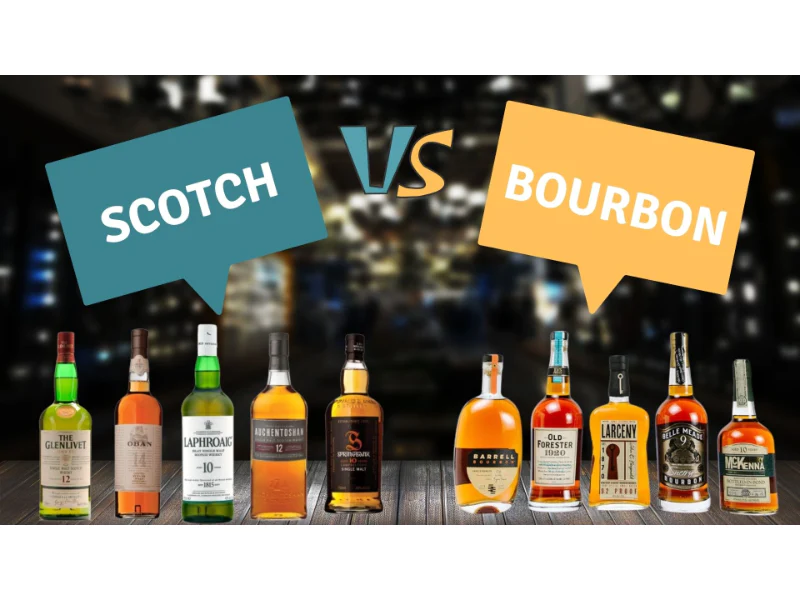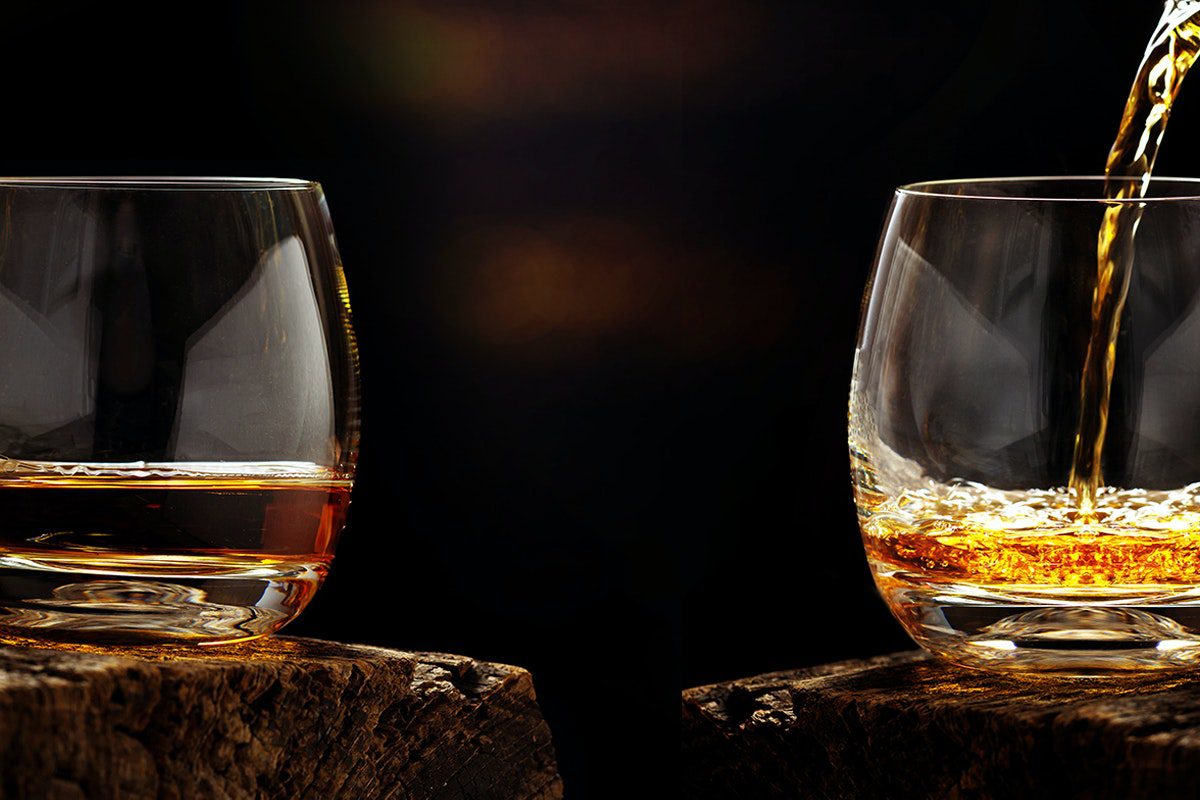In the vast world of spirits, two names often stand out, intriguing enthusiasts and novices alike: bourbon and Scotch. While both are distilled spirits and belong to the whiskey family, their differences stretch far beyond their names or places of origin. Dive with us into the nuanced world of bourbon and Scotch, and discover how two drinks, separated by an ocean, can represent so much about their respective cultures and histories.
The Birthplaces: America and Scotland
Bourbon finds its roots in the United States, with Kentucky often hailed as its spiritual home. The region's limestone-rich water provides an ideal base for producing bourbon, filtering out impurities and adding a unique mineral quality to the spirit.
Scotch, as the name implies, is a product of Scotland. The country's diverse regions, each with its unique climate and geography, play a pivotal role in the flavor profiles of various Scotches. From the maritime influences of Islay to the fresh, crisp airs of Speyside, each region imparts its distinct character onto the whisky it produces.
Ingredients and Distillation: The Building Blocks
Bourbon, by law, must be made from a grain mash that’s at least 51% corn. This significant corn presence gives bourbon its characteristic sweetness and full-bodied profile. Other grains that might be included are barley, rye, and wheat.
Scotch, on the other hand, varies. Single malt Scotch is made from 100% malted barley and produced at a single distillery, while blended Scotch can be a mix of malted barley and grain whiskies from different distilleries.
The Barrel Chronicles: Aging with Grace
Bourbon has strict rules about its barrels. It must be aged in new charred oak barrels, which lend it those beautiful caramel and vanilla notes. The charring process caramelizes the sugars in the wood, adding depth and character to the spirit.
Scotch barrels have more of a storied past. While they too are aged in oak, these barrels are often re-used, having previously held other spirits or wines. For example, many Scotch whiskies are aged in barrels that once held bourbon, sherry, or port, adding layers of complexity to their flavor.
Flavor Profiles: A Dance of Notes
When sipping bourbon, expect a symphony of flavors ranging from sweet notes of caramel, vanilla, and honey to spicier undertones of pepper and oak. The higher corn content often imparts a natural sweetness that’s both robust and comforting.
Scotch, given its diverse production methods and regional influences, offers a broad flavor palette. From the heavily peated, smoky drams of Islay to the light, floral notes of the Highlands, Scotch can take your palate on a tour of its homeland.
Cultural Impact and Global Reach
Both bourbon and Scotch are not just drinks; they're experiences, deeply intertwined with the cultures from which they emerged.
Bourbon, with its American roots, has been a staple in the world of cocktails. From the Old Fashioned to the Mint Julep, bourbon has played a key role in the American cocktail renaissance.
Scotch, meanwhile, is often associated with tradition, rituals, and ceremonies. The Scotch tasting ceremony, with its emphasis on nosing and appreciation, has become a global phenomenon, showcasing the spirit's depth and complexity.
Beyond the Glass
Bourbon and Scotch, while both members of the vast whiskey family, are distinct entities, each boasting its rich tapestry of history, flavor, and tradition. They represent the lands from which they hail, the people who crafted them, and the generations who have cherished them. In the battle of bourbon vs. Scotch, there's no winner; only two magnificent spirits that continue to enchant, sip after sip.

FAQs: Bourbon vs. Scotch
1. What's the primary difference between bourbon and Scotch?
Bourbon and Scotch are both whiskies but hail from different regions—bourbon from the United States and Scotch from Scotland. They also have distinct ingredients, aging processes, and flavor profiles that define them.
2. Is there a significance to the spelling: 'whisky' vs. 'whiskey'?
Yes! Typically, 'whisky' refers to Scotch whiskies and those from countries like Canada and Japan. 'Whiskey', with the extra 'e', is used for Irish and American variants.
3. Does bourbon have to be made in Kentucky?
While Kentucky is considered bourbon's spiritual home, bourbon can be produced anywhere in the U.S. The critical aspect is its adherence to specific production standards, not its state of origin.
4. What are the main ingredients in bourbon and Scotch?
Bourbon must be made from a grain mash that’s at least 51% corn. Scotch varies—single malt Scotch is made from 100% malted barley, while blended Scotch can be a mix of malted barley and grain whiskies.
5. How do the aging processes for bourbon and Scotch differ?
Bourbon must be aged in new charred oak barrels, which gives it its caramel and vanilla notes. Scotch, however, is often aged in re-used barrels that might have held other spirits or wines before, adding complexity to its flavor.
6. Can you describe the flavor profiles of bourbon vs. Scotch?
Bourbon typically presents sweet notes of caramel, vanilla, and honey, sometimes accompanied by spicier undertones. Scotch has a broader flavor range, from the heavily peated, smoky notes of Islay whiskies to the light, floral flavors from the Highlands.
7. How have bourbon and Scotch impacted global cultures?
Bourbon is integral to the American cocktail scene, starring in classics like the Old Fashioned and Mint Julep. Scotch, with its deep roots in tradition and ceremony, is celebrated for its rituals, especially the Scotch tasting ceremony.
8. Are bourbon and Scotch consumed differently?
Both can be enjoyed neat, on the rocks, or in cocktails. However, Scotch has a notable culture of tasting ceremonies, emphasizing nosing and appreciation. Bourbon, given its role in the cocktail renaissance, is often mixed in various drinks.
9. Which is smokier: bourbon or Scotch?
Some Scotches, especially those from Islay, are known for their heavily peated, smoky character. Bourbons, in contrast, tend to have a sweeter profile without the pronounced smokiness.
10. In the bourbon vs. Scotch debate, which one is better?
Neither is objectively better—it's a matter of personal preference. Both spirits have rich histories, unique flavor profiles, and deep cultural roots, making them beloved in their own right.
